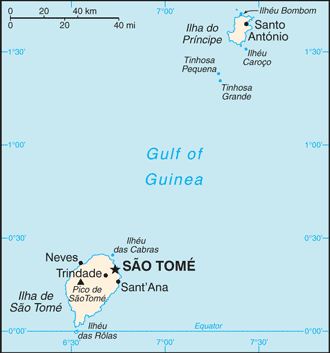São Tomé and Príncipe

The Democratic Republic of Sao Tome and Principe has an estimated population of 165,400 (UN, 2010). The capital is Sao Tome. Sao Tome and Principe has an area of 1, 001 sq km (386 sq miles). The main language is Portuguese.
Sao Tome and Principe is one of the smallest countries in Africa. It became independent in 1975; however, it was only in late 1980s that the country’s democratic reforms were enacted. Sao Tome and Principe was once a leading cocoa producer, but decreases in the production left the country heavily dependent on foreign aid.
Although the constitution gives equal rights to women and men in politics, access to education, business and governments, women still encounter a widespread societal discrimination. Domestic violence and rape are among the various forms of violence against women. Many women are reluctant to take legal action because traditional customs prohibits them from reporting domestic violence outside the family.
- Sao Tome and Principe has signed the Protocol to the African Charter on Human and Peoples' Rights on the Rights of Women in Africa (The Maputo Protocol) on the 1st of February 2010 but has not ratified.
- The Convention on the Elimination of All Forms of Discrimination against Women (CEDAW) was ratified by Sao Tome and Principe on the 3rd of June 2003.
- Sao Tome and Principe has not yet adopted a National Action Plan on United Nations Security Council Resolution 1325 (UNSCR 1325).
- There are no former or current UN peacekeeping mandates in Sao Tome and Prnicipe.
